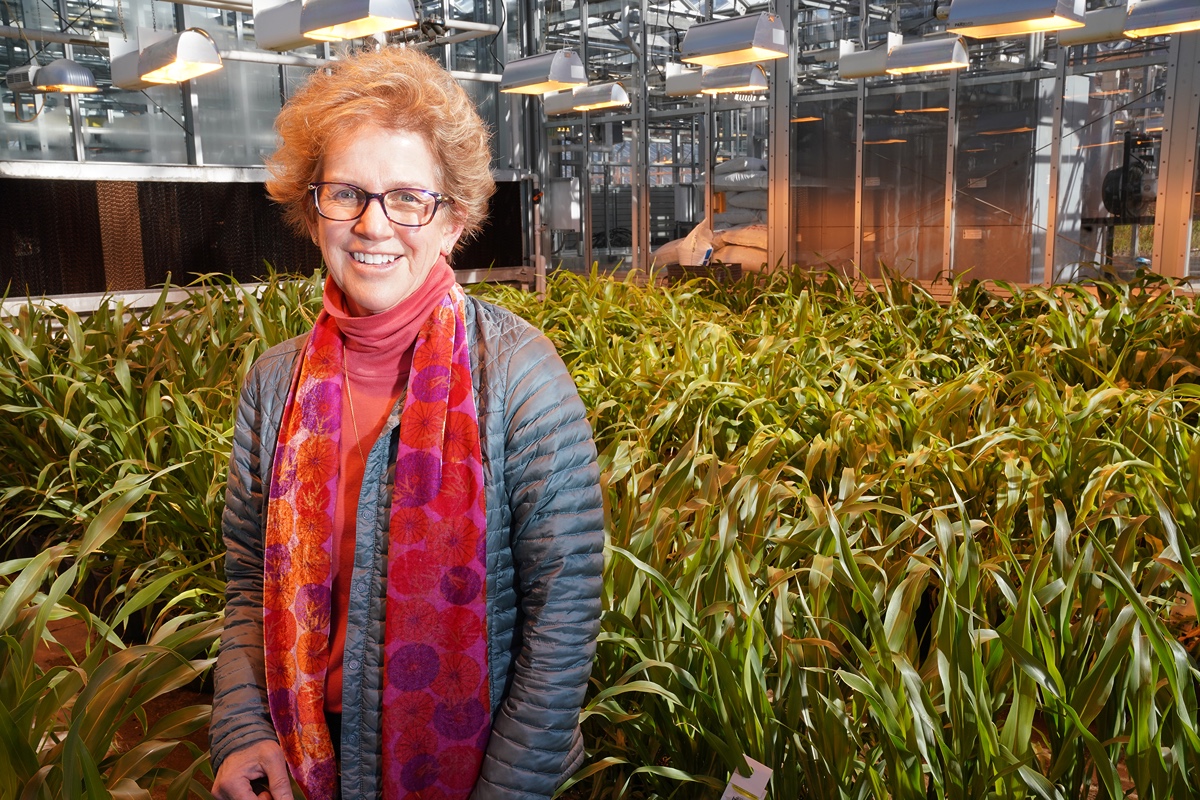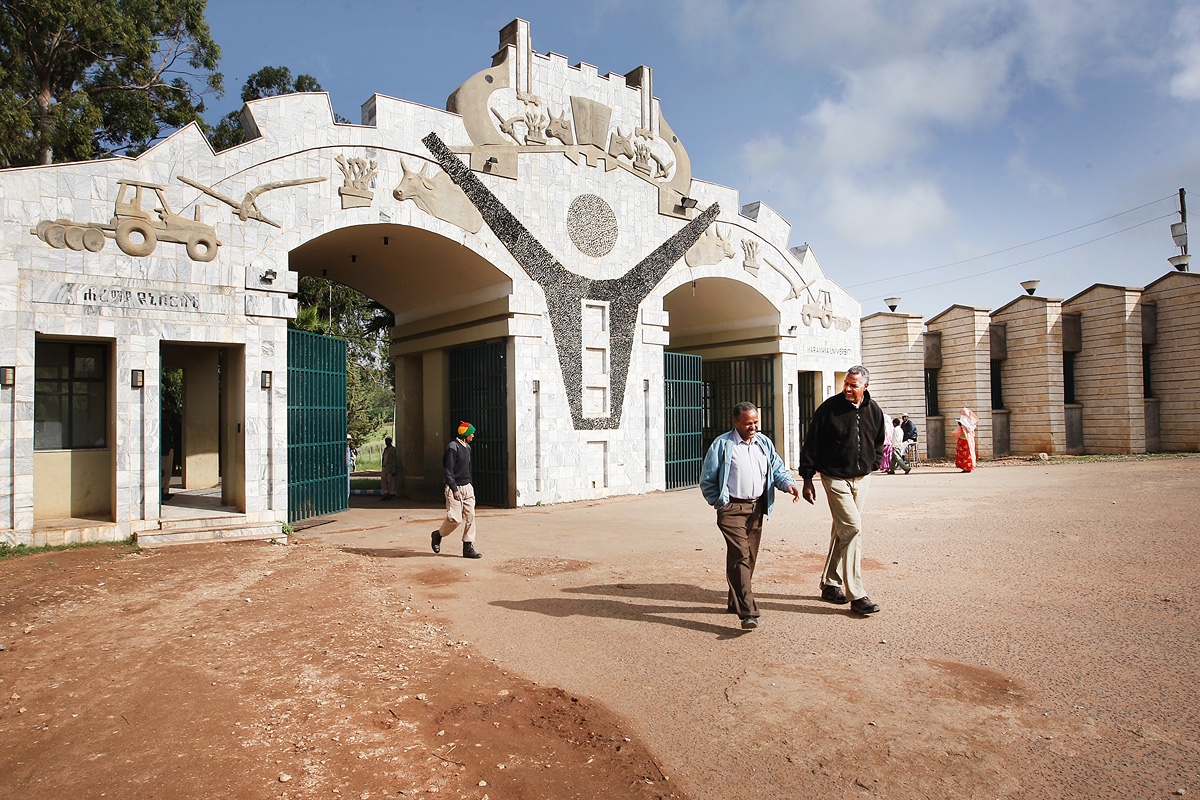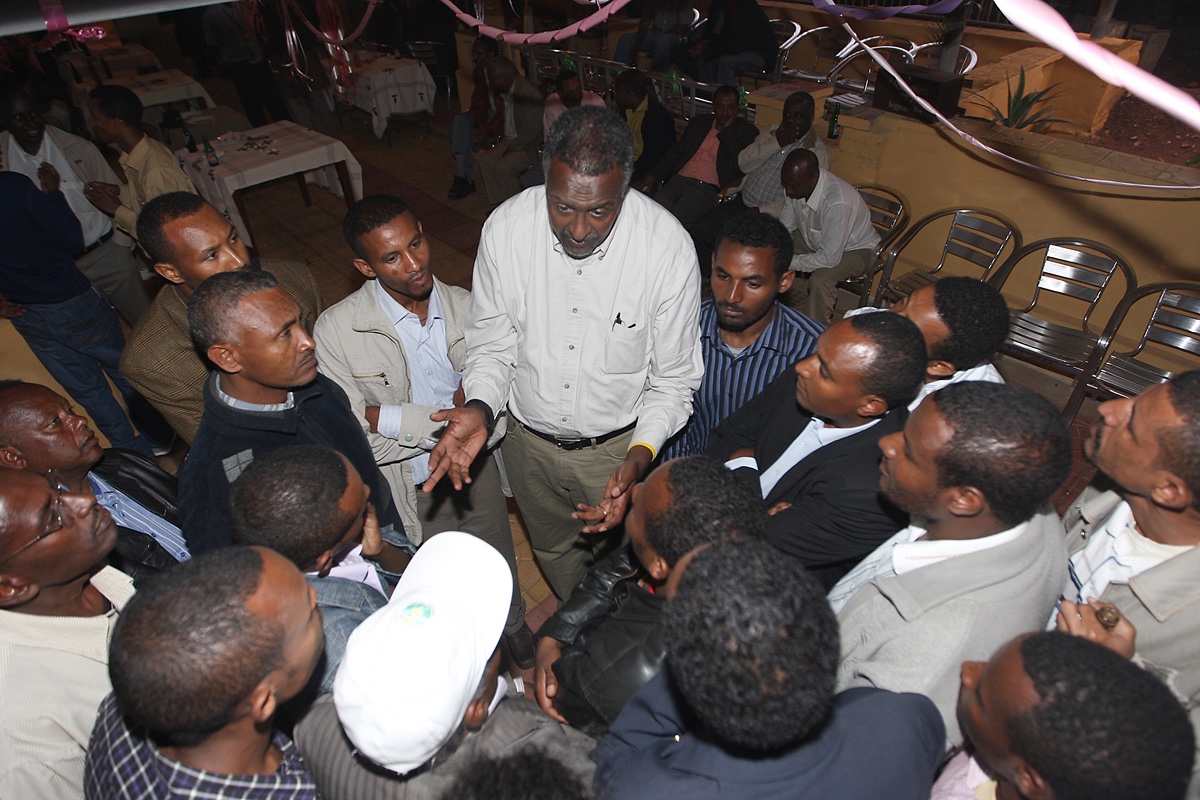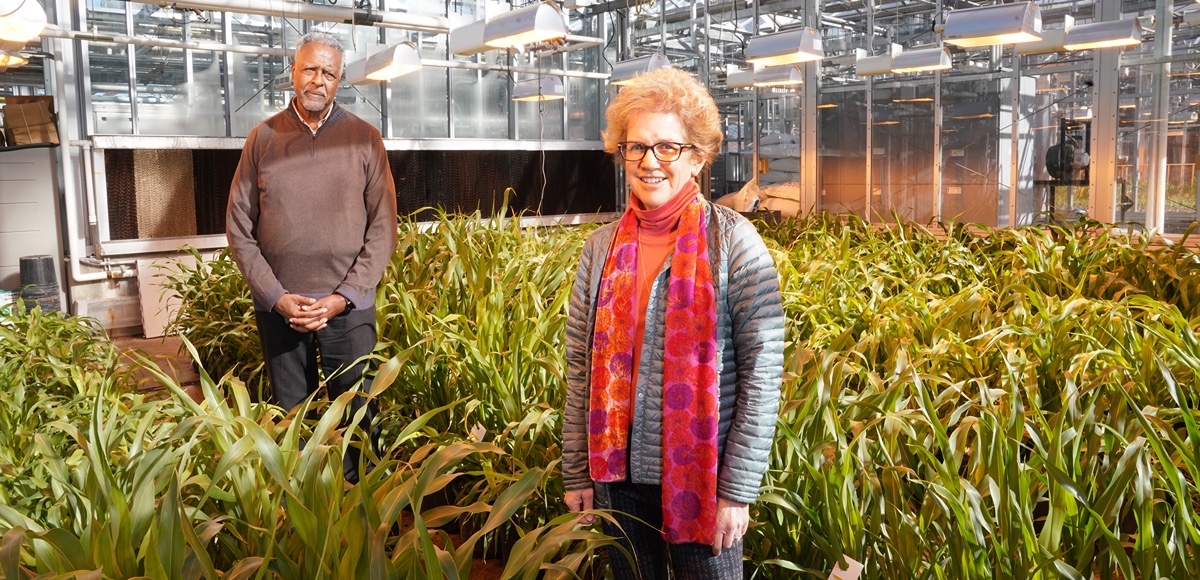Fighting the Causes of Hunger
The Purdue Center for Global food Security has a new director to help continue its mission
Hunger is one of humanity’s oldest and most primal problems. Despite the vast scientific advances that have allowed us to eradicate smallpox, travel to the moon, and carry tiny computers in our pockets, we still haven’t figured out how to make sure everyone has enough food. The causes of hunger have always been complex, and they’re growing even more so in our increasingly interconnected world.
The Purdue Center for Global Food Security (PCGFS) is dedicated to this enduring problem. With a new director, Sylvie Brouder, the Center is refreshing its role as a hub for interdisciplinary research and educational programming on food and nutrition security. After a period of quiescence during the pandemic, the Center will once again be abuzz with activity.
“With COVID, people at the university withdrew into their own programs,” says Brouder, Professor of Agronomy and the Wickersham Chair of Excellence in Agricultural Research. “In some cases they may have found that very beneficial, but I know that people miss the collegiality and miss the experience of collegial science for purpose, so I think of the Center for Global Food Security as an opportunity to do its bit for Purdue in refreshing and reengaging collegial science for purpose.”
Gebisa Ejeta, the Center’s executive director, is excited to welcome longtime colleague Brouder to the director role.
“She’s traveled around the world, and brings in a commitment and connection to feeding humanity at large,” he says.
The Purdue Center for Global Food Security was launched in 2011, with the aim of bringing together researchers and stakeholders in the areas of climate change, land use, food science, and other areas that bear on hunger and nutrition insecurity. The Center ran successful programs and engaged researchers across dozens of disciplines. But many of its projects were interrupted by the pandemic.
Now, more than a decade later, the Center has more challenges to address than ever before. Climate change, the pandemic, and geopolitical conflict have created chaos across the globe, throwing agriculture and food supply chains into disarray.
“Those combinations of problems have altered and dramatically impacted the already problematic food security agenda,” Ejeta says.
 Sylvie Brouder is announced as the new director of the Purdue Center for Global Food Security (PCGFS).
Sylvie Brouder is announced as the new director of the Purdue Center for Global Food Security (PCGFS). Technology, nutrition, climate resilience
In light of these issues, the Center plans to focus its efforts in three critical areas. The first is designing, developing and implementing appropriate food security technologies. The key word here is ‘appropriate.’ Too often people talk about “moonshots” and “silver bullets” – high tech, complicated, expensive, showy solutions, Brouder says.
“Agriculture on the ground is not about single solutions,” she says. “It’s about finding one or a small suite of contextually specific solutions that work.”
Ejeta gives the example of the PICS (Purdue Improved Crop Storage) bags. These are triple-layer sealed bags that keep bugs out of stored grains. It’s a low-cost technology that lets smallholder farmers store their grain without insecticides. Simple, but extremely impactful: farmers with good storage solutions can keep their crops to sell when prices are high, and can also have access to safe food for their own families, year-round.
Brouder also notes that, when people talk about ‘precision agriculture’ technologies, they’re often thinking of expensive computerized equipment. But precision agriculture can also mean a simple measuring scoop and instructions on precisely where to put fertilizer so there’s no excess, she says.
The Center’s second area of focus is creating programs to bolster the relationship between agriculture, nutrition, and health.
“There’s more of a focus than ever before on nutrition, so linking food and nutritional security with the new investments is a huge opportunity,” Brouder says.
The third area of focus is programs dealing with how to mitigate the effects of climate change on agriculture and food systems. This area draws from some of the philosophies of Brouder’s background as an agro-ecologist.
“Ecology isn’t necessarily about human dominance of the planet,” Brouder says. “Ecology is about systems, and we are part of a complex ecosystem. We have a responsibility to each other, and to the natural resource base.”
These three areas of focus will draw from many departments, and many disciplines, from economics to agronomy to engineering to public health to anthropology to botany.
 After being named a World Food Prize Laureate in 2009 for his work to end worldwide hunger, Gebisa Ejeta (right) returned to Haramaya College in his native Ethiopia.
After being named a World Food Prize Laureate in 2009 for his work to end worldwide hunger, Gebisa Ejeta (right) returned to Haramaya College in his native Ethiopia. Global partnerships for a more resilient world
Mitigating the effects of climate change on agriculture will involve working closely with scientists and farmers in the developing world.
“Those people are truly connected with the land, truly connected with their own people,” Ejeta says. “They know the species that they manage, both plants and animals, and that wisdom is extremely powerful.”
One program Brouder and Ejeta are both especially excited about relaunching is the partnership with Haramaya University in Ethiopia. With the financial support of the World Bank, the PCGFS had helped start the African Center of Excellence for Climate Smart Agriculture and Biodiversity Conservation at Haramaya in 2017. ‘Climate smart agriculture’ refers to agricultural practices resilient to a changing climate, and to farming systems that reduce greenhouse gas emissions or even help sequester carbon. Pre-pandemic, there were plans to send American students and faculty to work alongside their African counterparts on these topics.
“We were just getting started when the pandemic hit,” says Ejeta, who is from west-central Ethiopia and studied at what is now Haramaya University. “We hope to restart that if we can – that’s a win-win for our students here and the students in Africa.”
The Center’s leaders also plan a spate of new, globally-oriented programming. They hope to host speakers and panel discussions on food security every semester, as well as host a Global Leadership Forum at Purdue and possibly at the annual World Food Prize Borlaug Dialogue. They will also help convene a Purdue Global Food Security Conference building on lessons learned and outcomes of the Ending Global Hunger Colloquium held in 2019.
 Haramaya University faculty and students crowded around one of its’ most famous alums when Gebisa Ejeta returned to campus as the World Food Prize Laureate.
Haramaya University faculty and students crowded around one of its’ most famous alums when Gebisa Ejeta returned to campus as the World Food Prize Laureate. Looking to the next generation, seeing new sources of support
Other plans include relaunching the year-round internship program for undergraduate students, and – ideally – re-establishing the Borlaug Summer Institute, a two-week learning program for graduate students interested in global food security. The Institute was extremely popular, and students always emphasized how valuable it was to them, says Brouder. So, despite the heavy lifting that will be involved, “it would be silly to not try to get it going again.”
The Center’s leaders are also interested in the potential of starting a transdisciplinary Food Security graduate program, and creating a repository of free global food security educational resources for teachers. Aiming programs and resources at the next generation is critical.
“One of the things that impresses me the most is that the people who most connect with the climate change agenda are the young people who realize that it’s their world that we’re talking about and the problems that are emerging are going to be their problems in the future,” Ejeta says.
The goal of educational programing is both to impart professional expertise, and to amplify student knowledge as well. When the Center brings in students from other campuses, or even other countries, they’re able to share knowledge with each other and take that knowledge back to their own communities. A diversity of backgrounds and experiences creates a rich soil for seedlings of new ideas to sprout.
“The students themselves will create opportunities,” Ejeta says.
Though COVID derailed many of the Center’s projects and programs, it has had a silver lining, logistically: people are now much more comfortable working in hybrid modes of in-person and online engagement. Brouder and Ejeta hope this will make international engagement easier going forward.
“Prior to COVID, when we were discussing doing things, there were always these associated barriers, like how long can we send faculty, costs, scheduling issues,” Brouder says. “Many of these things are now less of an issue; we’re all used to doing things via hybrid mode.”
The Center certainly won’t be doing everything online. Its leaders plan to bring people together for “bigger opportunities but also bigger experiences,” Brouder says. “The purpose is really forming and shaping and aggregating the strength that we have on campus to do this research.”
The Center’s leaders hope to connect with community members at Purdue and beyond by holding a Townhall meeting to share the Advisory Board’s draft agenda for feedback, and to solicit ideas for the future. The meeting is currently planned for some time in Spring of 2023. It will be modeled on an initial Townhall meeting held at the Center’s inception in 2011, when a large number of Purdue faculty and students came out to share ideas and visions.
The Center will also be looking for partnerships and government agencies to support the work. “We can’t do research or education without resources,” Ejeta says.
Brouder adds, “it’s very important for us to make sure we are connected with the federal agencies as well as other non-federal organizations that are interested in this agenda, so building new linkages and refreshing old ones will be critical.”
 Gebisa Ejeta, executive director, and Sylvie Brouder, director of the Purdue Center for Global Food Security.
Gebisa Ejeta, executive director, and Sylvie Brouder, director of the Purdue Center for Global Food Security. Long-term visions for a sustainable future
For Brouder, the directorship of the PCGFS ties together many threads of her background and research. As a college student, she was interested in public health and medicine, and initially thought she’d be a doctor.
“But I didn’t like blood,” she says, laughing. “I switched to plants because they don’t bleed.”
In graduate school at the University of California, Davis, she worked on soil science. “I have a very quantitative approach, and soil fertility is very quantitative,” she says. She might have focused her work domestically, but she had mentors, including Ejeta, who encouraged her to look at international issues and pushed opportunities her way. Her work on agriculture and climate change recently earned her an appointment to the Environmental Protection Agency’s Scientific Advisory Board, where she helps review proposed actions.
It can be especially difficult to get public buy-in on climate and food security issues when people are feeling economic stress, as they are with the current inflation, Brouder says. At times like these it’s critical to help people understand the connection between food security and their own wellbeing.
“You want people to understand what their activities are doing to their own environment and to think about what they’re going to value long-term,” she says.
That’s no easy task. Which is part of why the fight for global food security is not likely to be over quickly. The PCGFS plans to be there for the duration.
“Food security is a continuous struggle, and it’s something that needs to be sustained over a long period of time, passed on from one generation to another. We’re making a connection between the food needs of today and the food needs of tomorrow, with how we live today affects the generations coming behind us.”
- Gebisa Ejeta, executive director of the Purdue Center for Global Food Security






